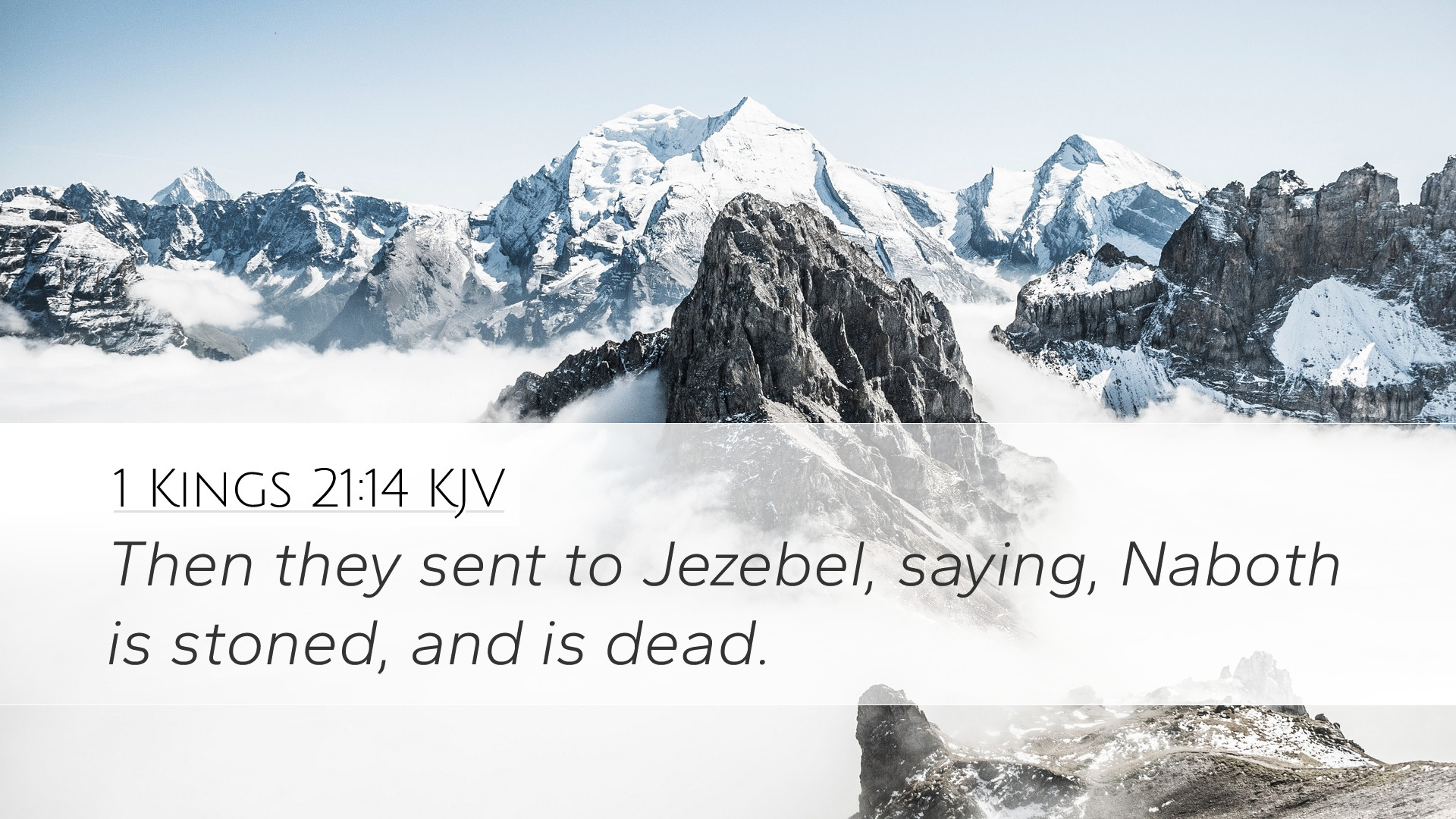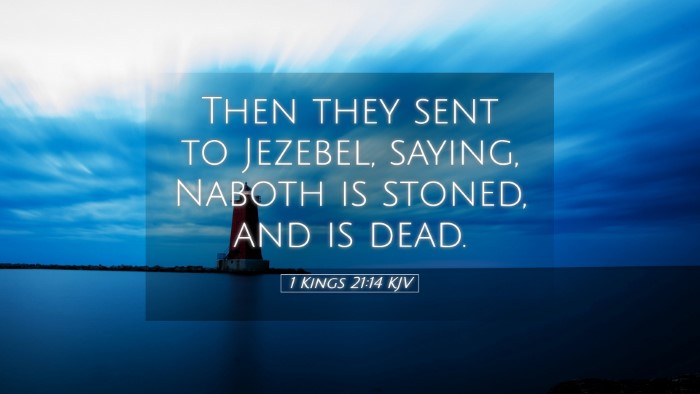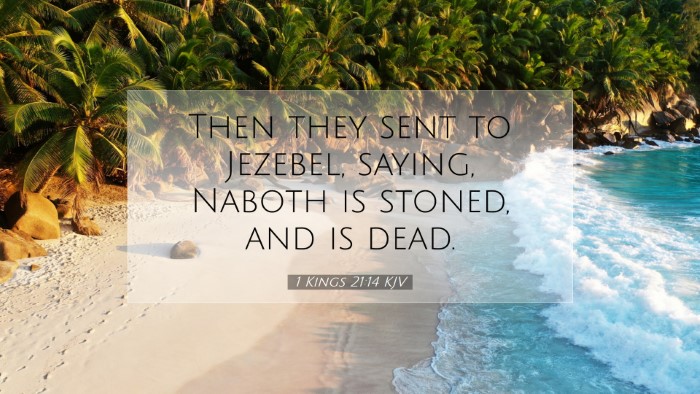Commentary on 1 Kings 21:14
Verse: "Then they sent to Jezebel, saying, 'Naboth is stoned, and is dead.'"
Introduction
This passage marks a significant moment in the narrative of King Ahab and Queen Jezebel, illustrating the depths of corruption and moral decay within the monarchy of Israel. The death of Naboth—a man unjustly executed for refusing to sell his vineyard—serves as a vivid example of the abuse of power and the desperate measures taken by those in authority to achieve their ends.
The Context of 1 Kings 21
1 Kings 21 details the confrontation between Naboth, a Jezreelite, and King Ahab, who sought to appropriate Naboth's vineyard. Ahab's desire for the vineyard, which was located next to his palace, signifies a lust for power and property that goes beyond mere possession—reflecting a deeper avarice that defines his reign.
As we delve into this passage, we explore various public domain commentaries to uncover its theological and moral implications.
The Cunning of Jezebel
Matthew Henry notes that Jezebel’s involvement in this situation was marked by her ruthless ambition. She orchestrated Naboth's execution with coldness, demonstrating a manipulative spirit that is emblematic of her character. She was not only a partner in Ahab's sin but took the lead in this treachery, showcasing the peril of unchecked power within a monarch's court.
Henry remarks on the contrast between Naboth’s integrity and the deceitfulness of Jezebel. Naboth’s refusal to sell his inheritance exemplifies a deep-rooted respect for God’s law concerning land ownership and family inheritance found in the Mosaic Code (see Leviticus 25:23-25). Jezebel, by contrast, acted with impunity as she subverted justice for her own desires.
Execution of Justice
Albert Barnes offers insight into the process by which Naboth was falsely accused. He highlights the significance of the two false witnesses citing Naboth for blasphemy, which aligns with the requirements of Jewish law (Deuteronomy 17:6). This judicial manipulation demonstrates a troubling reality where justice can be perverted by those who hold power.
Barnes emphasizes that Ahab's complicity in the plotting serves as a reminder of how leaders can fall into moral depravity by allowing others to carry out their wicked desires. The murky process of justice here highlights systemic corruption.
Naboth’s Silence and Integrity
Adam Clarke examines the character of Naboth, noting his unwillingness to capitulate to the king’s demand. Through his silence, Naboth maintained his integrity, representing a righteous remnant within Israel. Clarke points out Naboth’s adherence to moral principle over self-preservation, which is an essential quality that a believer should strive for in the face of adversity.
Moreover, Clarke refers to the irony of Naboth’s death: though he was innocent, his unjust execution would result in divine retribution for Ahab and Jezebel. This divine justice is a theme that resonates throughout Scripture, reminding readers that ultimate accountability lies with God.
The Theological Implications
From a theological perspective, this passage contains profound implications regarding the sovereignty of God, human authority, and the consequences of sin. The orchestration of Naboth's death reveals the tragic outcomes when a nation turns away from divine commandments. The corrupt practices of Ahab and Jezebel can serve as warnings to modern leaders and communities. Leaders are accountable not only to their constituents but to God, who sees all things—including hidden injustices.
Furthermore, the story underscores God's justice, foreshadowing the divine retaliation that would come upon Ahab and Jezebel for their heinous acts. As noted in the later verses of 1 Kings, Ahab’s tragic end and downfall as prophesied by Elijah serve as God’s ultimate judgment on unrighteousness.
The Lamentable Legacy of Ahab and Jezebel
In examining the legacy of Ahab and Jezebel as indicated in this passage, we recognize a cautionary tale of how power can corrupt. Henry suggests that their actions led not only to Naboth’s demise but also escalated the spiritual decline of Israel. The moral decay initiated by these leaders had far-reaching effects, contributing to the eventual downfall of the northern kingdom.
As pastors and theologians ponder this text, it becomes a call to introspection regarding leadership within the church and the world. Are there modern-day equivalents of Naboth, whose voices are silenced by those wielding power? It challenges leaders to administer justice and uphold the values of God's kingdom, acting as responsible stewards of their authority.
Conclusion
1 Kings 21:14 serves as a stark reminder of the realities of human depravity, the complexity of sin, and the repercussions of moral failure. Through the insights of Matthew Henry, Albert Barnes, and Adam Clarke, we see the layers of meaning in this tragic narrative. It reverberates through time, calling for justice, integrity, and a faithful witness among believers. As we engage with this text, let it inspire us to pursue righteousness amidst a world where injustice often reigns.


